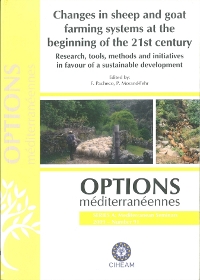| Article précédent | p. 261-264 | Article suivant |
Majorero PDO cheese production systems: cheese making and comercialization
The objective of this paper is the analysis of Majorero Protected Designation of Origin (PDO) systems making a special point on cheese making and commercialization. The study included in DOQUECAN project was performed on all farms and cheese factories (16) of Majorero PDO. The information was obtained from surveys and recorded data from the technicians of the Regulator Council. Majorero goat cheese is a typical product of Fuerteventura (Canary Islands, Spain), and is manufactured from Majorera goat's milk according to the specifications of its Regulatory Board (1996). It was the first Canary Island cheese and the first Spanish goat's cheese to obtain this distinction. Fuerteventura island has a rich farming tradition, and goats are very important to their economy. This cylindrical fat cheese could be consumed fresh (8-20 days), semihard (30 days) or hard (>60 days), weighing from 1 to 6 kilograms. The goat's census included in Majorero PDO farms was nearly twenty-five thousands (24,937). All the farms used mechanical milking machines. Most of them (85 percent) transformed crude milk into Majorero cheese while the remaining 15 per cent pasteurized their milk. Every producer used commercial rennet and starters in the cheese making process. The most usually commercialization method was direct sale (75 per cent) although intermediaries had also a great importance (65 percent).
L'objectif de cette communication est d'étudier les systèmes de production de l'Appellation d'Origine Contrôlée (AOC) Majorero en accordant une attention particulière à l'élaboration et à la commercialisation du fromage. L'étude, mise en place dans le cadre du projet DOQUECAN, a été conduite sur des exploitations et des fromageries (16) de l'AOC Majorero. L'information a été obtenue à partir des contrôles et des données des techniciens du Conseil Régulateur. Le fromage Majorero est un produit typique de l'île de Fuerteventura (aux Îles Canaries, Espagne), fabriqué au lait cru avec des chèvres de la race Majorera en respectant le cahier des charges de l'appellation d'origine (1996). Il a été le premier fromage canarien et le premier fromage de chèvre espagnol à recevoir cette distinction. L'île de Fuerteventura a une riche tradition dans la production animale et les chèvres jouent un rôle important dans l'économie. Ce fromage gras, cylindrique, peut être consommé frais (8-20 jours), semi-affiné (30 jours) ou affiné (> 60 jours), avec des poids variant de 1 à 6 Kg. Le recensement des chèvres des exploitations appartenant à l'AOC indique près de vingt-cinq mille têtes (24937). Toutes les exploitations utilisent la traite mécanique. La plupart d'entre elles (85 pour cent) transforment le lait cru en fromage Majorero, tandis que les 15 pour cent restantes pasteurisent leur lait. Tous les producteurs utilisent la présure et les initiateurs commerciaux dans la fabrication fromagère. La méthode de commercialisation la plus fréquente est la vente directe (75 pou cent) même si les intermédiaires ont aussi un rôle important (65 pour cent).
- [ Afficher ]
- [ Télécharger ]
- [ Exporter la citation ]
Vous pouvez télécharger la citation au format :
- [ Imprimer ]
-
Mots-clés
APPELLATION D'ORIGINE, CANARIES (ILES), CAPRIN, CIRCUIT DE COMMERCIALISATION, FROMAGE DE CHEVRE, SYSTEME D'EXPLOITATION AGRICOLECiter cet article
Álvarez S., González R., Calero P., Fernández G., Fresno M. Majorero PDO cheese production systems: cheese making and comercialization. In : Pacheco F. (ed.), Morand-Fehr P. (ed.). Changes in sheep and goat farming systems at the beginning of the 21st century : research, tools, methods and initiatives in favour of a sustainable development . Zaragoza : CIHEAM / DRAP-Norte / FAO, 2009. p. 261-264. (Options Méditerranéennes : Série A. Séminaires Méditerranéens; n. 91). Proceedings of the Seminar of the Subnetwork on Production Systems of the FAO-CIHEAM Network for Research and Development in Sheep and Goats, 2007/11/15-17, Ponte de Lima (Portugal). http://om.ciheam.org/om/pdf/a91/00801158.pdf



